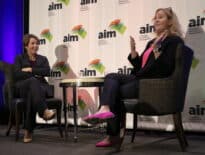There was a lot for real estate to like in Boston Mayor Michelle Wu’s first State of the City speech last week.
An ambition to grow the city by over 100,000 residents! The mayor’s obvious passion for the people of Boston, the kind of thing that can power an administration to solve really tough issues! An audience of stakeholders and enthusiastic supporters that might have been the most diverse in a long time – truly, a breath of fresh air!
At the same time, the city is staring down some frightening economic realities, chief among them a huge drop-off in the number of new housing units getting building permits, that threaten to punch holes in the city’s property tax-dependent budget and shrink the already-constricted supply of new apartments, sending rents even higher.
Boston was able to sustain its decade-long building boom on the back of cheap money that compensated for the rapid rise in construction costs and land prices. But that era is plainly at an end – even if the Federal Reserve blinks and lowers interest rates in the face of a recession this year, it would take an economic calamity to send rates back to near-zero.
Rate hikes have made building in Boston much harder. A development with a typical 5 percent return is easy to attract funding for when the risk-free alternative, namely government bonds, is going to earn practically no interest. With those returns now bumping over 3.5 percent, it’s much harder to justify investment in a new project given the serious risks inherent in development.
No one doubts that apartments built in Boston will be filled in the long term – the risks lie elsewhere. Will supply chain problems delay critical components or cause their prices to spike, pushing rents beyond what the market can bear? Will contaminated soil be found during demolition, thanks to an unreported heating oil leak decades ago? Will a recession hit as the building opens, thinning out the flow of people looking to or able to pay new-building prices when a project is at its most financially vulnerable?
With many smaller developers reliant on hard-money lenders, who charge much higher interest rates than local banks and can demand repayment on short timelines, every such delay or new city mandate and fee dramatically ups their expenses and raises the specter the project will end up losing money. And it’s not as though the city can look to affordable housing developers to pick up the slack. There simply isn’t enough grant money or low-income housing tax credits to meet demand – waitlists for these programs are already years long.
Last week, the mayor pledged to streamline and simplify the development approval process. It was music to some industry player’s ears, since time is money in the real estate world, but the city’s track record on this idea is not encouraging, as Scott Van Voorhis writes in his latest column.
Likewise, rezoning the city to permit as-of-right multifamily development is also promising and could help offset increased affordability requirements, but the development community appears extremely skeptical it will work. First, these processes are people-intensive at a time when the BPDA is short dozens of staffers. Second, they have historically taken many years – time the city doesn’t have.
But most of all, are Boston residents are ready for an as-of-right world? Will Wu stand up to neighborhood groups who will lose their ability to block even sensible projects in the name of “neighborhood character,” like Trinity Financial’s somehow-controversial proposal for three-and-a-half stories of mixed-income housing right next to the Red Line?
No doubt, more specifics will emerge in the coming months to allay some of the business community’s fears. But there is also a palpable trust deficit that the mayor needs to overcome and a lack of communication about the financial realities of real estate development today.
So far, Wu has been reluctant to meet with developers while she built out her team and elaborated her vision for the city. For the sake of the city and her own agenda, that has to end – not a return to the old ways when a mayor picked winners and losers, but not a rerun of her advisory groups on rent control and linkage fees, either. When the mayor’s campaign pledges and these committees’ outputs are compared, these committees appear to have been nothing but rubber stamps.
A robust effort to engage the business community is needed to find ways to jump-start projects that have city approval but can’t find financing with ideas like of New York City’s highly productive 421a affordable housing tax break, and make peace over issues like controversial affordable-unit hikes that threaten to run small builders out of business.
The business community is clearly wants to help Wu succeed, but they also feel like they haven’t been invited into the room to do so. If Boston is going to keep its property values healthy, and – more importantly – be the best city it can be and open to more than an elite few, business must have a chance to contribute to Boston’s future course, too.
Letters to the editor of 350 words or less may be submitted via email at editorial@thewarrengroup.com with the subject line “Letter to the Editor,” or mailed to the offices of The Warren Group. Submission is not a guarantee of publication.






